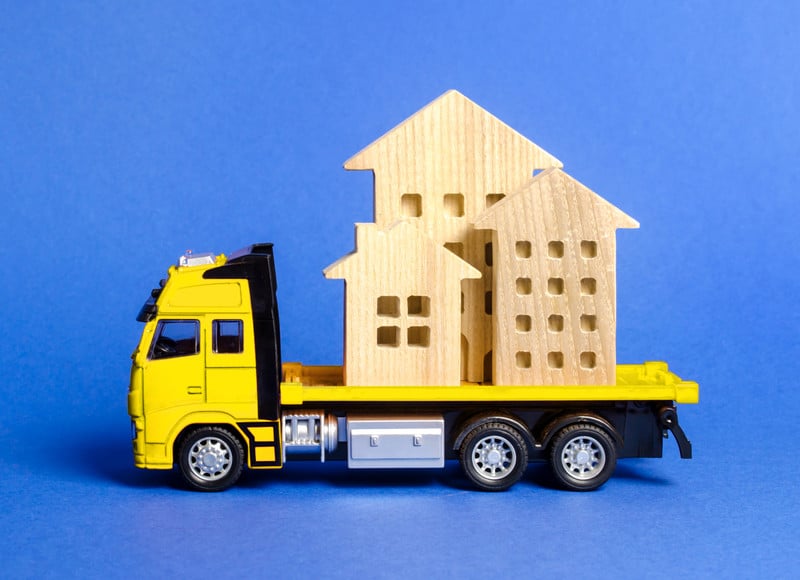A 500-mile move can cost as much as $10,000, but the final price of your relocation depends on several different factors. If you know what to look for (and how you can turn these extra fees into savings), you can move for a lot less.
The Moving APT research team took the time to figure out how much it usually costs to move 500 miles or more. We spoke with verified long distance movers, and we crunched some numbers with our own moving cost calculator to figure out the best ways to save.
If you’re moving 500 miles or more, read on to learn how much you should set aside, and how you can save your wallet.
Pricing Estimates for Moving Long Distance
The smaller the distance, the smaller the cost. We always recommend getting an exact quote from a long-distance moving company, but here’s a general overview of average costs based on distance:
| Distance | 1 Bedroom | 2-3 Bedrooms | 4-5 Bedrooms |
| 100 Miles | $1000 – $1500 | $1250 – $1700 | $1500 – $3400 |
| 250 Miles | $1200 – $2000 | $1500 – $3500 | $2,000 – $4800 |
| 500 Miles | $1500 – $2500 | $1800 – $5000 | $2,000 – $10,00 |
Keep in mind, your costs can fluctuate depending on the size of your home, too. For instance, relocating a 5-bedroom home over 250 miles might cost anywhere from $2,000 to over $4,800, depending on your specific needs and services.
The Average Price of Long-Distance Movers
Whether you’re moving 100 miles, 500 miles, or coast to coast, long distance movers will cost you anywhere between $1,000 and $10,000 – sometimes more, and sometimes less. To get a more accurate estimate, it’s important to know what long moving entails in the first place.
In the moving industry, a long distance move is generally defined as anything over 100 miles or across state lines. Long distance moving companies charge based on the weight or volume of your items (pounds or cubic feet, respectively), as well as the distance everything has to travel.
Aside from the weight/volume and mileage, you’ll need to factor in the price of additional services. Packing, premium moving for bulky or high-value items, and even access fees for long hallways and multiple staircases can contribute to a higher price.
Pro tip: If you want an accurate estimate, you’ll have to contact a the moving company directly. They may rely on detailed inventory lists, or they may send an agent for an in-home estimate. Whatever the case, request a binding estimate to ensure they don’t throw in any surprise fees.
How to Estimate Moving Costs
If you’re planning a 500 mile move, here’s how you can get an idea of how much the whole process will set you back:
1. Figure out the size of your move
The larger your move, the more expensive you can expect it to be. You don’t necessarily need to break out the measuring tape, but jot down an inventory list of your large items of furniture.
2. Map out the distance of your move
At longer distances, your prices for moving will increase. Figure out the exact miles from point A to point B.
3. Choose the services you’ll need
Do you want to handle some (or all) of your move, or are you planning on hiring some professional help? DIY costs less than full-service movers, but you may end up losing big when it comes to stress and time.
4. Save the date
If you want to save big, avoid a summer move. June, July, and August are always the busiest months for moving, and that means higher prices. We recommend avoiding major holidays, too. Shoot for a mid-month, mid-week relocation.
5. Shop around
With an inventory list, an exact mileage, and an idea of the services and dates you’re interested in, moving companies can provide you with a much more accurate estimate. Collect at least 3 different quotes to compare prices and services.
Whether it’s 500 miles or 1500, it’s important to know some details about your move before you make any calls. And once you get to shopping around, be sure to ask your movers about any extra fees or moving costs…
Additional Fees & Moving Costs
There are a lot of factors that go into the final price of your move. If you want an accurate idea of how much a 500 mile move costs, keep these extra fees in mind:
1. DIY vs full-service movers
A DIY move is a great way to save money, but it’s a lot more stressful (and time-consuming) than hiring full-service movers who can take care of all the boxing and packing for you.
2. Packing supplies
Some movers charge for packing supplies, such as bubble wrap and packing paper. Chat with your movers about what’s provided on moving day, and see if they can throw in anything extra.
3. Specialty items
If you have artwork, antiques, a pool table, or anything else that’s large, heavy, or high-value, your movers may charge you extra for the extra TLC. It’s a small price to pay for added peace of mind.
4. Stair or elevator fees
As you can imagine, navigating a ton of staircases while carrying a sofa is not a good time. While movers may not charge for just one flight of stairs, they’re likely to charge for any extras.
5. Long carry fees
Does your apartment building have a long hallway or lobby? Does your house have a long driveway? If movers have to walk more than 75 feet to reach your home, you may be subject to long carry fees, with additional fees per 75 feet.
6. Shuttle service
In some cases (mainly big cities), movers aren’t allowed to park an entire big rig on the street outside your new place. This means they’ll have to leave the big truck in a staging area, and use a smaller shuttle to get stuff back and forth.
How much does it cost to move 500 miles? It varies. While the price depends mainly on how much stuff you’re hauling and how far you’re going, be sure to ask your movers about these additional fees before you sign any contracts.
Frequently Asked Questions
Can moving companies be negotiated with?
Fortunately, it’s absolutely possible to negotiate with a mover. Many companies provide discounts or other ways to reduce your moving costs (such as flexible moving dates), and some may also try to price match or beat competitor prices if you bring them another quote. It never hurts to ask.
How much does it cost to ship a car?
Shipping a car can range from $500 to $3,000, but like the cost of the rest of your move, it depends on how far it’s traveling. The price of car shipping also depends on the type of trailer: Open trailers are cheaper, but if you’re sending your Countach across country, you’ll want to pay the extra cash for the protection of a covered trailer.
Can movers transport a single piece of furniture?
Most moving companies have a weight minimum, so they may not accept a single piece of furniture. Some movers do offer partial load shipping, but you’ll have to ask ahead of time about their minimum. Otherwise, you may have better luck shipping the piece through a national carrier.
What is moving labor?
If you’re trying to DIY your move but you need a hand with some of the heavier stuff, you can actually book moving labor to help you load and pack. Moving labor doesn’t generally go with you all the way to your destination, but they can help you get everything in the truck and squared away for transport. It’s a good mid-point between a full DIY and paying for full-service moving.
What’s the cheapest way to move?
The cheapest way to move is usually to rent a truck and handle the heavy lifting yourself. However, after you factor in the price of your truck rental, the price of gas, and food, lodging, and parking fees, your savings really get eaten up – especially if you have to take time off from work to deal with your move. Full-service moving can be pricier, but the savings on stress are worth it.
Recap
A 500 mile move can cost you anywhere from $800 to $3,000, but the exact price comes down to the services you’ll need, how much you’re moving, and the schedule you’re keeping. Use a moving cost calculator to get a more accurate estimate, and don’t forget to shop around and collect a few quotes before committing to a reputable moving company.
PS: If you’re still planning out your move, check back in with Moving APT for more tips and tricks to make the moving process even easier! Best of luck with the boxing and packing, and safe travels on the big day.






